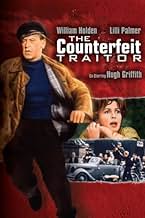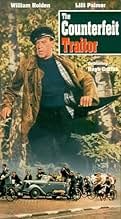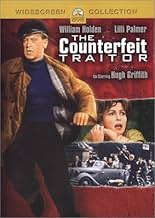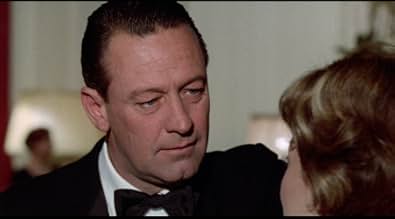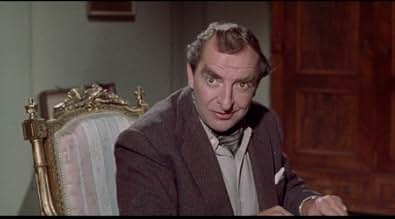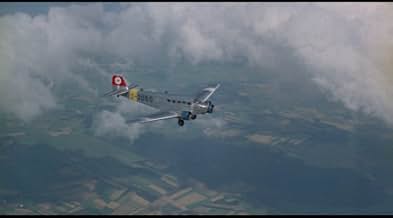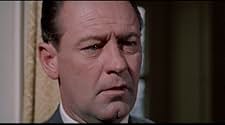IMDb रेटिंग
7.4/10
3.2 हज़ार
आपकी रेटिंग
अपनी भाषा में प्लॉट जोड़ेंBlacklisted in modern day WW2, a Swedish oil trader opts to assist British Allies, by means of infiltrating and surveying Nazi Germany.Blacklisted in modern day WW2, a Swedish oil trader opts to assist British Allies, by means of infiltrating and surveying Nazi Germany.Blacklisted in modern day WW2, a Swedish oil trader opts to assist British Allies, by means of infiltrating and surveying Nazi Germany.
Erik Schumann
- Nazi Gunboat Officer
- (as Erik Schuman)
फ़ीचर्ड समीक्षाएं
I've seen this movie a few times and each time its gets better. William Holden plays a true life character who was a Swedish Oil executive who is blackmailed into becoming an agent for the Allies in Nazi Germany. Holden's performance is true to life in this film. His character is not a glamorous secret agent who takes on the entire Gestapo and makes love to scores of beautiful women with no ill-effects on his person. Holden's character narrates the story much through the film and one is genuinely engrossed in his exploits and how he will escape out of the country in the film climax. In addition, the producers filmed the story in postwar Germany using authentic locations. Plus the atmosphere of the film captures much of the ordinary day to day life during the latter days of Nazi Germany. Great Film and one of Holden's better performances
The beginning-the first third overall-is rather tedious ,with too much voice-over.No interesting character emerges and it essentially consists of William Holden's shuttling back and forth between Suede and Germany. One feels like calling it a day but wait....
The second third makes Lilli Palmer's character the center of the plot:a very interesting one,this German wealthy woman who betrays her country because of her Christian belief.This spy is not a routine femme fatale but a human being,who is smitten with remorse because the bombing which her informations allowed led to children's death.She has wonderful lines:"in a war,every victim becomes a brother".Two marvelous scenes:the first one ,probably the strongest in the whole movie,shows Palmer in a confessional,telling her sins to a man she thinks is a priest;the second one,she's to be shot in a jail,while Holden desperately tries,behind his bars, to say a last goodbye to her.Lilli Palmer's performance is moving,responsible and sensitive.
By the third part,no more Palmer,but the movie has hit its stride.Holden's return to Suede becomes an odyssey,with a lot of traps and his character has grown wiser and more human.He's able to show some compassion,probably the woman's influence.One of the most intriguing characters plays a small part now:a young boy,about 12,member of the Hitlerian Youth,proud of his uniform,he will make your hair stand on end.At the end of the movie,Holden has completely understood Palmer's line about the victims/brothers as the scene with Klaus Kinski testifies.
George Seaton has made an entertaining movie,which does not forget to ask questions and to moot responsibility.He does flay the nazi horrors,but he also puts the blame on the English agents ,stuffing themselves with lobster and sipping Champagne,while other people die unnoticed ,simply because the victims are their brothers.
The second third makes Lilli Palmer's character the center of the plot:a very interesting one,this German wealthy woman who betrays her country because of her Christian belief.This spy is not a routine femme fatale but a human being,who is smitten with remorse because the bombing which her informations allowed led to children's death.She has wonderful lines:"in a war,every victim becomes a brother".Two marvelous scenes:the first one ,probably the strongest in the whole movie,shows Palmer in a confessional,telling her sins to a man she thinks is a priest;the second one,she's to be shot in a jail,while Holden desperately tries,behind his bars, to say a last goodbye to her.Lilli Palmer's performance is moving,responsible and sensitive.
By the third part,no more Palmer,but the movie has hit its stride.Holden's return to Suede becomes an odyssey,with a lot of traps and his character has grown wiser and more human.He's able to show some compassion,probably the woman's influence.One of the most intriguing characters plays a small part now:a young boy,about 12,member of the Hitlerian Youth,proud of his uniform,he will make your hair stand on end.At the end of the movie,Holden has completely understood Palmer's line about the victims/brothers as the scene with Klaus Kinski testifies.
George Seaton has made an entertaining movie,which does not forget to ask questions and to moot responsibility.He does flay the nazi horrors,but he also puts the blame on the English agents ,stuffing themselves with lobster and sipping Champagne,while other people die unnoticed ,simply because the victims are their brothers.
There really isn't much more to say except this gripping portrayal by Holden and Palmer is well worth the watching. Without exception the actors gave a fine performance, but the true heroes are the real people who risked their lives during WWll. Thank you AMC for bringing us this superb, often under rated film.
Alexander Klein wrote a 1958 book about Erickson's World War II exploits, The Counterfeit Traitor, which was made into 1962 this movie of the same name .True life espionage story about a businessman (an effective William Holden ) who lives a mission as double agent for the Allies during WWII. It begins in Stockholm 1942 . He made scores of trips to Germany between 1941 and 1944 , the hazards were great. He gathered priceless information on Germany's oil refineries, which he turned over to his Allied contacts . Gestapo agents tracked him on his visits to Germany. Though Erickson knew that he was under constant surveillance, he went about his oil business as well as the business of spying. One of his closest confederates was a woman (a haunting Lilli Palmer). Gestapo agents suddenly rushed in and arrested them both. Both were confined at Gestapo headquarters .
This is a suspense thriller full of tension , agonisingly intriguing and entertainment. Frequently riveting but overlong , it results to be a magnificent film. There are tremendous acting from the main protagonists as Holden and Palmer . Furthermore , splendid support cast from Germany as Klaus Kinski , Wolfgang Preiss, Werner Peters ,Schuman ; from Denmark as Reichhardt and from Sweden as Palme. Sensible and stirring musical score by the classic Alfred Newman . Colorful cinematography by the French Jean Bourgoin .The producers wish to express their gratitude to the city government of Stockholm , Copenhagen , Hamburg and West Berlin whose cooperation made it possible to photograph the authentic locales in the re-creation of this true story. The motion picture is stunningly directed by George Seaton. Professional and polish writer and director who occasionally rose well above his average standard and was twice rewarded with Academy Award for so making . Seaton formed a partnership with William Perlberg , was to produce all Seaton's movies for several years. Both of them produced and directed the following successes as ¨Miracle on 34th Street¨, ¨The country girl¨, a monster Box office as ¨Airport¨ , another unusual War film as ¨36 hours¨ and of course ¨Counterfeit traitor¨.
Based on true events , Erickson spied on German synthetic oil plants for the American OSS in World War II. At the outbreak of World War II, Erickson offered his services to the United States. Pretending that he was a Nazi, Erickson visited Germany more than 30 times between 1939 and 1945.Working with a few German industrialists and businessmen who were part of the conspiracy. He and his women accomplice were arrested. The woman, however, had been under suspicion as being a spy. The Germans concluded that Erickson was simply a businessman seeking sexual gratification but the woman was a spy. The Allies stepped up their bombing of Germany and Nazi-occupied countries in 1943, but had difficulty in locating the oil refineries that kept Hitler's war machine moving. Erickson was told by his OSS spymasters that he had to locate the key refineries. Erickson and his wealthy German business friends, he said, planned to build a huge oil refinery in neutral Sweden, safe from Allied bombers. This plant, when running at peak capacity, could deliver all the oil Germany might need. If he went ahead with his plans, he explained, he would want an exclusive contract with the Germans. Erickson then pointed out that he had few friends in Sweden because of his long association and loyalty to Nazi Germany. He also pointed out to the Gestapo chief that his name was on the Allied blacklist, a fact that Himmler already knew and one that endeared Erickson to his cold heart. As they talked, Himmler came quickly to believe that Erickson was an opportunist who had thrown in his lot with the Germans after they had scored lightning success through blitzkrieg invasions. He was also impressed in the detailed blueprints for the proposed Swedish oil refinery that Erickson had taken pains to prepare and submit for examination. Erickson then explained that, before he and his partners put up their millions to build the plant, he would have to inspect present oil refineries and receive from experts and technicians in the field, all important information on operations in order to better build a highly productive refinery. Himmler authorized Erickson to travel anywhere in the Reich or occupied territories, to investigate any oil refinery operation he wanted to see, and to get from experts any information he desired in preparation of building the proposed refinery in Sweden. He was also given an order signed by Hitler that provided automobiles for Erickson . Erickson was shocked to run into a man he thought long dead, a German oil executive he had formerly known . He told the Nazi that it was simply good business to have joined the Germans, and that he was a businessman first and always. He told the man that he had been on the Allied blacklist for years after establishing friendships with German Nazis. He then played his trump card, showing him his newly-signed Gestapo papers, which bore the name of Heinrich Himmler .This seemed to convince the Nazi that Erickson, was, indeed, to be trusted.In the months to follow, the intrepid spy toured almost every major oil refinery in Germany and the occupied countries. He obtained detailed plans of oil operations and these quickly wound up in the hands of the OSS, MI6, and, subsequently, the Allied air forces, which then bombed the refineries out of existence. Lack of oil caused the surrender of more than 300,000 German troops in the Ruhr Valley, the last real threat in the West against the Allies. Following the war, General Dwight D. Eisenhower attributed the Allied victory to the destruction of the German oil industry and almost all of the credit for that destruction was due to one man, Eric Erickson.
This is a suspense thriller full of tension , agonisingly intriguing and entertainment. Frequently riveting but overlong , it results to be a magnificent film. There are tremendous acting from the main protagonists as Holden and Palmer . Furthermore , splendid support cast from Germany as Klaus Kinski , Wolfgang Preiss, Werner Peters ,Schuman ; from Denmark as Reichhardt and from Sweden as Palme. Sensible and stirring musical score by the classic Alfred Newman . Colorful cinematography by the French Jean Bourgoin .The producers wish to express their gratitude to the city government of Stockholm , Copenhagen , Hamburg and West Berlin whose cooperation made it possible to photograph the authentic locales in the re-creation of this true story. The motion picture is stunningly directed by George Seaton. Professional and polish writer and director who occasionally rose well above his average standard and was twice rewarded with Academy Award for so making . Seaton formed a partnership with William Perlberg , was to produce all Seaton's movies for several years. Both of them produced and directed the following successes as ¨Miracle on 34th Street¨, ¨The country girl¨, a monster Box office as ¨Airport¨ , another unusual War film as ¨36 hours¨ and of course ¨Counterfeit traitor¨.
Based on true events , Erickson spied on German synthetic oil plants for the American OSS in World War II. At the outbreak of World War II, Erickson offered his services to the United States. Pretending that he was a Nazi, Erickson visited Germany more than 30 times between 1939 and 1945.Working with a few German industrialists and businessmen who were part of the conspiracy. He and his women accomplice were arrested. The woman, however, had been under suspicion as being a spy. The Germans concluded that Erickson was simply a businessman seeking sexual gratification but the woman was a spy. The Allies stepped up their bombing of Germany and Nazi-occupied countries in 1943, but had difficulty in locating the oil refineries that kept Hitler's war machine moving. Erickson was told by his OSS spymasters that he had to locate the key refineries. Erickson and his wealthy German business friends, he said, planned to build a huge oil refinery in neutral Sweden, safe from Allied bombers. This plant, when running at peak capacity, could deliver all the oil Germany might need. If he went ahead with his plans, he explained, he would want an exclusive contract with the Germans. Erickson then pointed out that he had few friends in Sweden because of his long association and loyalty to Nazi Germany. He also pointed out to the Gestapo chief that his name was on the Allied blacklist, a fact that Himmler already knew and one that endeared Erickson to his cold heart. As they talked, Himmler came quickly to believe that Erickson was an opportunist who had thrown in his lot with the Germans after they had scored lightning success through blitzkrieg invasions. He was also impressed in the detailed blueprints for the proposed Swedish oil refinery that Erickson had taken pains to prepare and submit for examination. Erickson then explained that, before he and his partners put up their millions to build the plant, he would have to inspect present oil refineries and receive from experts and technicians in the field, all important information on operations in order to better build a highly productive refinery. Himmler authorized Erickson to travel anywhere in the Reich or occupied territories, to investigate any oil refinery operation he wanted to see, and to get from experts any information he desired in preparation of building the proposed refinery in Sweden. He was also given an order signed by Hitler that provided automobiles for Erickson . Erickson was shocked to run into a man he thought long dead, a German oil executive he had formerly known . He told the Nazi that it was simply good business to have joined the Germans, and that he was a businessman first and always. He told the man that he had been on the Allied blacklist for years after establishing friendships with German Nazis. He then played his trump card, showing him his newly-signed Gestapo papers, which bore the name of Heinrich Himmler .This seemed to convince the Nazi that Erickson, was, indeed, to be trusted.In the months to follow, the intrepid spy toured almost every major oil refinery in Germany and the occupied countries. He obtained detailed plans of oil operations and these quickly wound up in the hands of the OSS, MI6, and, subsequently, the Allied air forces, which then bombed the refineries out of existence. Lack of oil caused the surrender of more than 300,000 German troops in the Ruhr Valley, the last real threat in the West against the Allies. Following the war, General Dwight D. Eisenhower attributed the Allied victory to the destruction of the German oil industry and almost all of the credit for that destruction was due to one man, Eric Erickson.
Although unappealingly long - 140 minutes to be precise - The Counterfeit Traitor turns out to be an absorbing, disturbing and rather exciting wartime suspense film. It gives William Holden his second-best role of the '60s (surpassed only by his work in The Wild Bunch) and provides good subsidiary roles for Lilli Palmer, Hugh Griffith and Ernst Schroeder.
Holden is terrific as a Swedish citizen born in the USA, named Eric Erickson. Erickson is a businessman trading oil from his Stockholm HQ during WWII. Many of his customers are Germans, and quite often he goes on business trips to war-torn Germany leaving the sanctuary of neutral Sweden behind. The British secret service approach him and plead for him to act as a spy, gathering sensitive information for them during his seemingly legitimate trips. Matters are complicated when Erickson meets fellow spy Marianne Mollendorf (Lilli Palmer), with whom he soon falls in love. His mission is seriously jeopardised when her spying antics are exposed, and she is seized by the Gestapo and taken away to be executed.
The film is well-made by ever-reliable director George Seaton. Seaton also wrote the screenplay, basing it on an Alexander Klein book, and he must be given credit for fashioning a thoroughly believable and suspenseful story. The film is shot on actual North European locations, and the use of real backdrops - as opposed to the usual studio lensing favoured by Hollywood in the early '60s - adds to the film's authentic flavour. Nowadays, the appeal of this kind of film is sadly limited, but if you have an affinity for this kind of stuff, then The Counterfeit Traitor is definitely a title worth tracking down.
Holden is terrific as a Swedish citizen born in the USA, named Eric Erickson. Erickson is a businessman trading oil from his Stockholm HQ during WWII. Many of his customers are Germans, and quite often he goes on business trips to war-torn Germany leaving the sanctuary of neutral Sweden behind. The British secret service approach him and plead for him to act as a spy, gathering sensitive information for them during his seemingly legitimate trips. Matters are complicated when Erickson meets fellow spy Marianne Mollendorf (Lilli Palmer), with whom he soon falls in love. His mission is seriously jeopardised when her spying antics are exposed, and she is seized by the Gestapo and taken away to be executed.
The film is well-made by ever-reliable director George Seaton. Seaton also wrote the screenplay, basing it on an Alexander Klein book, and he must be given credit for fashioning a thoroughly believable and suspenseful story. The film is shot on actual North European locations, and the use of real backdrops - as opposed to the usual studio lensing favoured by Hollywood in the early '60s - adds to the film's authentic flavour. Nowadays, the appeal of this kind of film is sadly limited, but if you have an affinity for this kind of stuff, then The Counterfeit Traitor is definitely a title worth tracking down.
क्या आपको पता है
- ट्रिवियाThe German spy for the OSS, Frau Marianne Möllendorf in the movie, was a real person whom Erickson fell in love with. Her real name was Anne-Maria Freudenreich. The Swedish national archives in Stockholm have photographs and letters Erickson received from her.
- गूफ़When Erickson goes to the "red light" district in Hamburg to make his contact with the underground, the street is ablaze with light from the windows and street lamps, something that would never have been seen in wartime, when blackout precautions were rigidly imposed - particularly in a city like Hamburg, which was a routine and consistent target of Allied bombers.
- भाव
Eric Erickson: How does a person get to be so cold-blooded?
Collins: Watching German planes bomb London helps *enormously*!
- क्रेज़ी क्रेडिटOpening credits classify the cast members by country.
- कनेक्शनFeatured in Der vergessene Spion: Verkürzte ein Verrat den Zweiten Weltkrieg? (2025)
टॉप पसंद
रेटिंग देने के लिए साइन-इन करें और वैयक्तिकृत सुझावों के लिए वॉचलिस्ट करें
विवरण
- चलने की अवधि2 घंटे 20 मिनट
- पक्ष अनुपात
- 1.85 : 1
इस पेज में योगदान दें
किसी बदलाव का सुझाव दें या अनुपलब्ध कॉन्टेंट जोड़ें


